Le Touquet: The 'most British of French resorts'
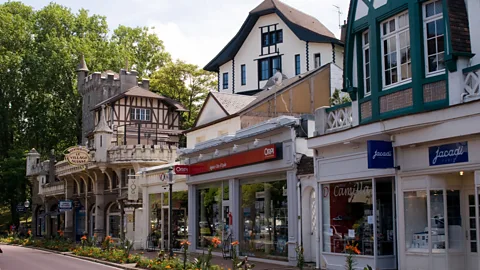 Alan Moore/Alamy
Alan Moore/AlamyIt attracted Winston Churchill, inspired James Bond and is set to rename its airport after the late Queen Elizabeth II. But this decidedly British resort isn't actually British.
Overlooking the English Channel is a small resort town bedecked with freestone facades and half-timbered houses. English is heard everywhere, from the Art Deco Westminster hotel to the lighthouse, which, on the occasion of the late Queen Elizabeth II's Platinum Jubilee, was lit up with Her Majesty's favourite colours. The bells of city hall chime in an echo of Big Ben, and it was just announced that the town's airport will soon be rechristened after Queen Elizabeth II.
You wouldn't be alone in thinking this place is in Britain – but it's not. Le Touquet-Paris-Plage sits on the French Opal Coast and has long been known as the "most British of French resort towns".
"French tourists are always like, 'Oh, it's so English here!" said Kate Landry-Madden, a town council member. "And the English who come over are always like, 'Oh, it's so French in le Touquet! So, it's just this funny mixture of the best of both worlds, really."
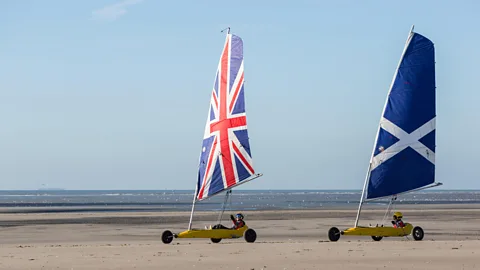 Gruffydd Thomas/Alamy
Gruffydd Thomas/AlamyThe deep roots linking Le Touquet to the opposite shore began with the purchase of the town by John Robinson Whitley, a linoleum magnate from Leeds, in 1894. What had been established in 1837 as a haven for wealthy Parisians soon became a cradle for British gentry, complete with tennis courts and horse riding, all of which, according to Mayor Daniel Fasquelle, were "imagined to attract a British clientele".
"It's not insignificant that le Touquet's golf course was inaugurated by the British prime minister in 1904," he said.
With the 1913 completion of the Casino de la de La Forêt, Le Touquet became even more of a playground for affluent Brits, from playwright Noel Coward to Winston Churchill. The future King Edward VIII was a mainstay of the baccarat tables, and novelist Ian Fleming found inspiration here for the first James Bond book, Casino Royale. WriterPG Wodehouse even lived here from 1934 until he was interned by the Wehrmacht in 1940.
Some of Le Touquet's architectural heritage survived World War Two, with 21 buildings protected as historical monuments – the most of any French seaside resort. The link with Britain remained strong, bolstered by the airport, France's third largest at the time. It was at the Westminster hotel that, in 1962, Sean Connery signed his first James Bond contract, and "Le Westminster's" only suite is numbered 007 in his honour.
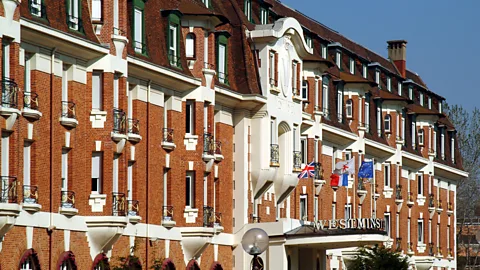 ImagesEurope/Alamy
ImagesEurope/AlamyAccording to Fasquelle, it's the town's golf courses that have provided the most lasting draw for Brits. Fleming's Le Touquet home was located beside the 18th hole of the oldest of the three, La Forêt, while La Mer, a six-time French Open host, is perhaps the most famous. An internationally renowned equestrian park and 33-court tennis club only add to the draw for fans of sport. This year, Le Touquet is also welcoming the England rugby team for its World Cup training camp.
"There are really some amazing stories linked to this special relationship we have with the British," said Fasquelle. "That we don't just want to keep, but also to reinforce – and in some ways, rediscover."
Indeed, these days, locals are working hard to maintain this cherished connection. Eli Gifford is one of them, raised in Le Touquet from the age of seven by his filmmaker parents, Londoners Nick and Judy Gifford, who, 25 years ago, founded Tea Together, an organic jam company marrying French and British inspiration for flavours like cherry-tarragon or lemon-Earl Grey tea.
His hometown, Gifford said, has a distinctly British vibe, with "lots of vintage cars and things like that. It's like everyone's kind of living their fantasy dream life here," he said. "It's very odd when you leave and go to like… Paris or something."
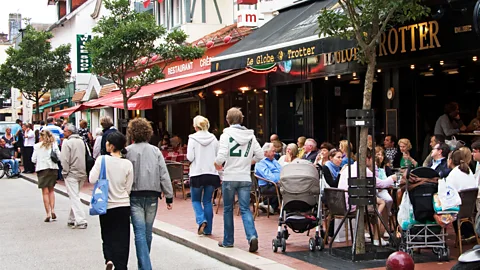 Mark Bassett/Alamy
Mark Bassett/AlamyGifford noted that the town itself "isn't huge", but it does boast a few spaces where Brits feel even more at home, like Elizabeth's English tea room, founded and managed by Elizabeth Velissariou, or Le Globe Trotter, an English pub founded by a Frenchman named Olivier Dehaffreingue 26 years ago. Dehaffreingue's love for British culture and music has led him to invite local English-language pop-rock cover bands to play at the pub, and they frequently show football, rugby, golf and cricket on the big screen, creating an ambiance that makes the pub a go-to for Anglophone and Anglophile visitors and residents.
There's a British accent to Le Globe Trotter's food offerings, too, which include cheese boxes curated by Arthur Duhamel of Les Petits Plaisirs Anglais (Little English Pleasures), a Le Touquet-based importer of British products started by his French mother and British stepfather following their discovery, a decade ago, of Snowdonia's waxed cheddars. Today, the business has evolved into a twofold endeavour, the importing side joined by a fast-casual restaurant called Croque's & Pies specialising in British pies and croque monsieurs with a British twist.
Duhamel says his clientele at Croque's & Pies is mainly French – "and good thing, too! Because otherwise, we wouldn't be here in anymore".
Indeed, the double whammy of Brexit and Covid has changed many things for the small seaside town. Duhamel's previous commitment to 100% British sourcing at Croque's & Pies has become too fastidious to continue. And while Fasquelle said that until recently, up to a quarter of hotel guests in town were British, those numbers have fallen significantly.
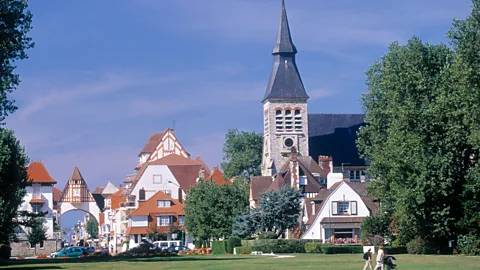 CW Images/Alamy
CW Images/AlamyBut Fasquelle hasn't lost hope. "We want to bounce back," he said. "To show that in spite of Brexit, we can maintain strong links with Great Britain."
Thus, the name change for the airport where Fleming once arrived with his Aston-Martin in the hold, the fruit of "quite a long process", according to Landry-Madden.
"I think that people think you just say, 'Yeah, we want to change the name!'" she said. "But no, you can't use the Royal Family's name without their official authorisation."
In its proposal, made to the British Embassy, just six days after Her Majesty's death in September 2022, the town had to provide arguments as to why the change was warranted or deserved. Landry-Madden interpreted the near-year of silence as a quiet but powerful no.
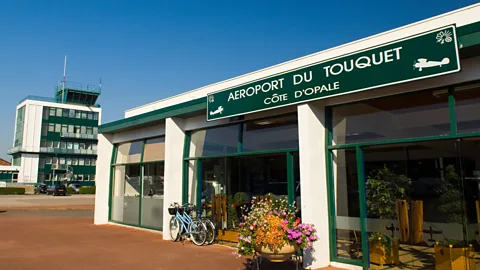 David Jones/Alamy
David Jones/Alamy"And then suddenly, a message came through saying that King Charles had approved!" she said, attributing this, perhaps, to Fasquelle's doggedness and regular meetings with the British ambassador to France, Dame Menna Rawlings, who was invited to Le Touquet earlier this spring.
"We're sending a strong sign of friendship to Britain," said Fasquelle of the airport soon to be rechristened Elizabeth II Le Touquet-Paris-Plage International Airport. "That's how I see it."
That's how many locals see it as well. Following Brexit, Landry-Madden said, "I think a lot of people felt kind of rejected, and so of course it's important for British to know we still want them to come to Le Touquet."
"British customers are really important to us, and keeping that link is really important to us," she continued. "All those little things that make people feel welcome."
For others, it's largely symbolic.
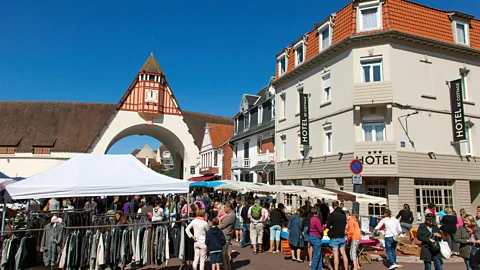 Hemis/Alamy
Hemis/Alamy"I think it's good for tourism," said Duhamel. "But personally, it didn't really affect me much." (He has, nevertheless, maintained a "little British connotation" at his restaurant, with a portrait of the late Queen on the wall.)
"As the town has a long history with England, and the Royal Family, I believe that naming the airport Queen Elizabeth II is in homage to our late queen," said Velissariou. "Whether or not this will entice more English customers, I can't really comment."
Perhaps even more essential, locals say, are the city's other steps towards reinforcing this bond: the systematic translation of documents at art exhibits into English, the organisation of annual events like the Le Touquet Music Beach concert, which this summer welcomed 50,000 people. The King's coronation, Landry-Madden recounts, was projected on a massive screen to a full auditorium with even more pomp and circumstance than the events she attended back home in Britain.
"Everybody was drinking Champagne in Le Touquet for the coronation," she said. "There was a lot of excitement about the Royal Family."
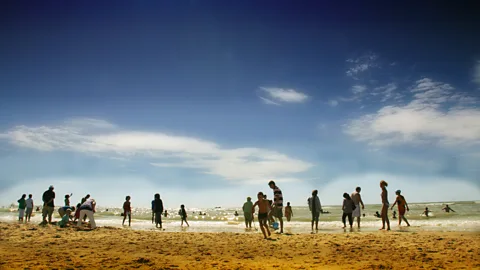 Inmacor/Getty Images
Inmacor/Getty ImagesFollowing Covid and Brexit, Brits are coming back to Le Touquet, much to the relief of local business owners. But economics are just part of the ensuing pleasure at the return to the status quo. "There's this nice sort of side to English people coming and partying," Duhamel said. "You can feel it right away, when you're in a restaurant or a bar and they're there."
And at the end of the day, their presence is part of Le Touquet's local identity.
"The resort was created by the English, and for the English," said Duhamel. "You can't remove it from the DNA of Le Touquet."
---
Join more than three million BBC Travel fans by liking us on Facebook, or follow us on Twitter and Instagram.
If you liked this story, sign up for the weekly bbc.com features newsletter called "The Essential List". A handpicked selection of stories from BBC Future, Culture, Worklife and Travel, delivered to your inbox every Friday.
